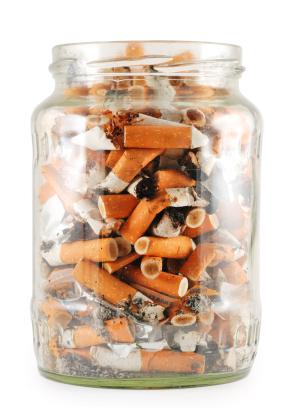
Một nhà thương công quản, thuộc Đại học Tiểu Bang Louisiana, không thể viện cớ miễn trách về bồi thường dân sự, vin vào tính cách cơ sơ công cộng, khi cơ sở này có bổn phận/có thể biết tới tình trạng hà tì, hư hỏng mà không có biện pháp gìn giữ lối đi cho sạch sẽ, để cuống thuốc lá, ngổn ngang trên thềm ra vào, đã gây tai nạn cho viếng khách khi họ tới thăm bệnh nhân điều trị tại đó.
Although, it is well known that cigarette smoke can be harmful to a person’s health, cigarette butts can also be dangerous. The question decided by the Louisiana Second Circuit Court of Appeal in Adams v. Louisiana State University Health Sciences Center Shreveport (“LSUHSC”, was whether, as a matter of law, LSUHSC, a public facility, is exempt from responsibility for the damages Sherry Adams sustained when she fell on a wet cigarette butt located on a handicap entrance ramp to the facility.
On August 9, 2005, Ms. Adams, an off-duty LSUHC employee, slipped and fell when she was going to visit her uncle who was a patient in the hospital. As a result of the fall, Ms. Adams sustained serious injuries to her right hand, fingers, and right ankle. She sued LSUHSC alleging that, at the time of the incident, the ramp was unreasonably dangerous and defective because of the collection of cigarette butts on the ramp. She further alleged that LSUHSC knew or should have known of the unreasonably dangerous condition or defect associated with the collection of cigarette butts and that the condition could have been prevented if the hospital had exercised reasonable care.
After sufficient discovery, LSUHSC filed a motion for summary judgment, which was granted. The trial court found that: (1) Ms. Adams claims arose under La. C. C. art. 2317 (pdf), which imparts liability upon owners for damages caused by their defective things, and La. R.S. 9:2800 (pdf), Louisiana’s statute limiting liability for public entities arising from public property; (2) Ms. Adams could not meet her burden of proof against LSUHSC; and, (3) the accumulation of cigarette butts did not constituted a defective condition or an unreasonably dangerous condition as contemplated by law.
On appeal, the Second Circuit reversed and remanded the case to the trial court, holding that the trial court had incorrectly applied Louisiana law regarding a defective condition in property and that Ms. Adams’ claims against LSUHSC were correctly asserted under La.C.C. art. 2315 (pdf), Louisiana’s general tort law. The Second Circuit relied upon its own prior ruling in Holden v. Louisiana State University Medical Center-Shreveport in which it held that La. C.C. art. 2317 and La.R.S. 9:2800 do not apply when a person slips and falls on a foreign substance located on a premises. The court explained that there is a difference between “a defect in the premises” and “a defect on the premises.” Therefore, the court concluded that “the temporary presence of a foreign substance is not, in and of itself, a defect for purposes of strict liability under La. C.C. 2317” and, by extension, La. R.S. 9:2800. Rather, in such cases, the court held that negligence is measured by La. C.C. art. 2315.
The court also noted that a hospital owes a duty to its visitors to exercise reasonable care to keep its premises in a safe condition commensurate with the particular substance involved but that the standard of care for a hospital is lower than that for a merchant. The Second Circuit held that, because the trial court applied the incorrect law, the trial court failed to consider the relationship between the risk of someone slipping and falling on cigarette butts located on the handicap ramp and the reasonableness of the measures taken by the hospital to eliminate that risk.
In addition, after conducting a complete review of the trial court summary judgment record, the Court concluded that Ms. Adams had identified material issues of fact that precluded summary judgment. Among the disputed facts was that: (1) LSUHSC had some knowledge of the cigarette butts at the entrance where Ms. Adams fell; (2) someone was supposed to clean the entranceway where Ms. Adams fell; and, (3) the person who cleaned the entrance may not have done it regularly. Moreover, the Court held that the evidence in the record was enough to provide factual support that LSUHSC had actual or constructive notice of the cigarette butts on the ramp. The Court also held that it was a jury’s function, not the court’s, to decide if LSUHSC’s policy for keeping the entrance ramp clean was reasonable. The Court, ultimately, held that LSUHSC failed to carry its initial burden of proving there was no genuine issue of material fact and that it was entitled to judgment as a matter of law.
Take-Away: The Adams’ case demonstrates that a state run hospital can not rely upon La. R.S. 9:2800 to exempt it from its general duties to keep its premises safe. This case also demonstrates that a hospital cannot prevail on a summary judgment if the plaintiff establishes that the hospital may have had some knowledge of a potentially defective condition or did not have a policy to reasonably rectify a known defective condition.
Dow Edwards










































